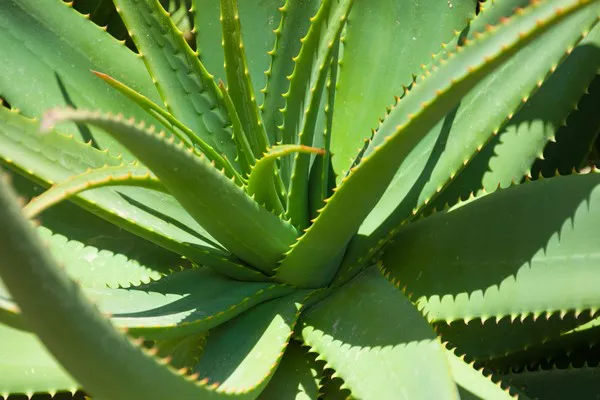In the vast tapestry of nature, certain plants stand out not just for their beauty but for their incredible healing properties. For centuries, indigenous cultures and traditional medicine practitioners have relied on the medicinal prowess of various plants to treat ailments and promote well-being. In this extensive exploration, we delve into the world of medicinal plants, unveiling the top 15 most powerful medicinal plants.
Top 15 Most Powerful Medicinal Plants
1. Aloe Vera (Aloe barbadensis miller): The Soothing Succulent
Aloe vera, a succulent native to North Africa, has been revered for its healing properties for millennia. The gel extracted from its fleshy leaves is renowned for its anti-inflammatory, antibacterial, and moisturizing effects. Aloe vera is commonly used to treat burns, wounds, and skin irritations. Additionally, its internal consumption is believed to aid digestion and support the immune system.
2. Turmeric (Curcuma longa): The Golden Healer
Turmeric, a vibrant yellow spice native to Southeast Asia, has gained global recognition for its potent anti-inflammatory compound, curcumin. Used in traditional Ayurvedic medicine, turmeric is known for its antioxidant properties and its ability to alleviate conditions like arthritis, digestive issues, and even certain skin conditions. Regular consumption of turmeric is linked to overall well-being and improved immune function.
3. Ginger (Zingiber officinale): Nature’s Anti-Nausea Remedy
Ginger, a pungent root originating from Asia, is celebrated for its anti-nausea and anti-inflammatory properties. Its bioactive compound, gingerol, is credited with the herb’s therapeutic effects. Ginger is commonly used to alleviate nausea, motion sickness, and inflammation. It is also recognized for its potential in reducing muscle pain and soreness.
4. Garlic (Allium sativum): Nature’s Antibiotic
Garlic, a culinary staple, is not just a flavorful addition to dishes; it also possesses powerful medicinal properties. Allicin, the active compound in garlic, exhibits antibacterial, antiviral, and antifungal properties. Garlic is believed to support cardiovascular health by lowering blood pressure and cholesterol levels. Additionally, it is recognized for its immune-boosting capabilities.
5. Echinacea (Echinacea purpurea): The Immune Enhancer
Echinacea, a flowering plant native to North America, is widely used to support immune function. Rich in flavonoids, echinacea is believed to stimulate the immune system, reducing the severity and duration of colds. This medicinal plant is available in various forms, including teas, tinctures, and supplements, making it a popular choice for those seeking natural immune support.
6. Ginseng (Panax ginseng): Adaptogenic Powerhouse
Ginseng, particularly Panax ginseng, is an adaptogenic herb renowned for its ability to enhance the body’s resistance to stress and promote overall vitality. Used in traditional Chinese medicine for centuries, ginseng is believed to improve mental clarity, boost energy levels, and support the immune system. It is available in various forms, including capsules, teas, and extracts.
7. Lavender (Lavandula spp.): Calming Aromatherapy
Lavender, with its fragrant flowers and soothing aroma, goes beyond its aesthetic appeal to offer potent calming and healing properties. Lavender essential oil is widely used in aromatherapy to reduce stress, anxiety, and promote relaxation. Additionally, lavender is recognized for its antimicrobial properties, making it a valuable addition to natural remedies for skin conditions and insect bites.
8. Peppermint (Mentha x piperita): The Digestive Aid
Peppermint, a hybrid mint crossbreed of watermint and spearmint, is revered for its digestive benefits. The menthol in peppermint helps relax muscles in the gastrointestinal tract, alleviating symptoms of indigestion, bloating, and irritable bowel syndrome (IBS). Peppermint tea, oil, or capsules are commonly used to harness its digestive and soothing properties.
9. Chamomile (Matricaria chamomilla): Gentle Relaxation
Chamomile, known for its delicate, daisy-like flowers, is celebrated for its gentle sedative and anti-inflammatory properties. Chamomile tea is a popular remedy for promoting relaxation, alleviating anxiety, and improving sleep quality. This medicinal herb is also recognized for its potential in soothing digestive discomfort and supporting skin health.
10. Holy Basil (Ocimum sanctum): The Sacred Herb
Holy Basil, also known as Tulsi, holds a revered status in Ayurvedic medicine. This adaptogenic herb is believed to enhance resilience to stress, support the immune system, and promote mental clarity. Holy Basil is commonly consumed as a tea or supplement and is considered a potent ally in promoting overall well-being.
11. St. John’s Wort (Hypericum perforatum): Nature’s Mood Enhancer
St. John’s Wort, a yellow-flowered plant native to Europe, is renowned for its potential in treating mild to moderate depression and anxiety. The active compounds, hypericin and hyperforin, are believed to influence neurotransmitters in the brain, promoting a positive mood. St. John’s Wort is available in various forms, including capsules, teas, and extracts.
12. Ginkgo Biloba (Ginkgo biloba): Cognitive Support
Ginkgo biloba, derived from the leaves of the ancient ginkgo tree, is recognized for its potential cognitive benefits. This medicinal plant is believed to enhance blood circulation, particularly to the brain, and may improve memory and cognitive function. Ginkgo biloba is commonly used in supplements and herbal remedies aimed at supporting mental clarity and overall brain health.
13. Valerian (Valeriana officinalis): Natural Sleep Aid
Valerian, a perennial herb with sweetly scented pink or white flowers, is renowned for its sedative properties. The compounds in valerian root are believed to interact with neurotransmitters, promoting relaxation and supporting a restful sleep. Valerian is often used in herbal teas, tinctures, and supplements to address insomnia and sleep-related disorders.
14. Arnica (Arnica montana): Herbal First Aid
Arnica, a yellow-flowered herb native to Europe and Siberia, is recognized for its anti-inflammatory and analgesic properties. Arnica is commonly used topically in creams, ointments, or gels to alleviate pain, bruising, and inflammation associated with injuries, muscle soreness, or arthritis. This herbal remedy is a staple in natural first aid kits.
15. Eucalyptus (Eucalyptus spp.): Respiratory Revitalizer
Eucalyptus, with its distinct menthol-like aroma, is valued for its respiratory benefits. The essential oil derived from eucalyptus leaves is commonly used in inhalants, chest rubs, and steam inhalation to relieve congestion, coughs, and respiratory discomfort. Eucalyptus is a natural decongestant and possesses antimicrobial properties.
In conclusion, the world of medicinal plants offers a rich tapestry of healing possibilities, with each herb contributing its unique set of benefits to holistic well-being. From the soothing properties of aloe vera to the cognitive support of ginkgo biloba, and the mood-enhancing effects of St. John’s Wort, nature’s pharmacy is abundant with powerful allies. Integrating these medicinal plants into a holistic health regimen allows individuals to tap into the age-old wisdom of traditional medicine and experience the healing potency that nature generously provides. As with any form of self-care, it is advisable to consult with a healthcare professional before incorporating new herbs or supplements into one’s routine, especially for those with pre-existing health conditions or taking medications.
You Might Be Interested In:













![10 Most Richest Cities in the United States [Revealed!]](https://www.validdownloads.com/wp-content/uploads/2023/12/Castor-Bean-Plant.webp)













